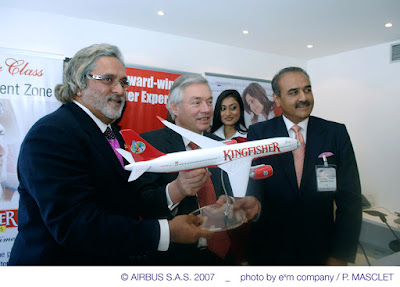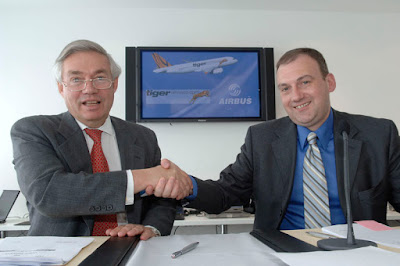Airbus has completed another order-filled day at the Paris Air Show, eclipsing rival Boeing yet again in terms of orders. Here's a wrap-up:

United Arab Emirates-based Etihad Airways purchased twelve Airbus wide-bodies, dividing the order between five A330-200s, three A330-200Fs, and four A340-600s. The order provides a bit of a boost for the A340 program, which has seen few orders recently.

As mentioned yesterday, Aeroflot bought five more A321s, as well as ten more A330-200s (which will be leased) and also placed a firm order for 22 A350s, which it had committed to back in March. Aeroflot will be relatively unique in that it will be operating both the A350 and its arch-rival, the Boeing 787.

Mumbai, India-based Kingfisher Airlines, which has been growing rapidly, has signed a Memorandum of Understanding (MoU) to buy up to 50 Airbus planes. The agreement is for 15 A350-800s, 10 A330-200s, 5 A340-500s and 20 A320 family planes.
Two carriers from Libya also placed orders with Airbus today. Afriqiyah Airways placed a firm order for five A320s and signed a MoU to acquire six A350s, with delivery starting in 2017. Libyan Airlines also signed a MoU to buy four A350s, four A330-200s and seven A320s, allowing the airline to modernize its fleet of aging planes.
Yekaterinburg, Russia-based Ural Airlines signed an MoU to purchase five A320s that will allow it to phase out the old Tupolev Tu-134s and -154s that it currently operates on short-to-medium range routes. The airline already operates two leased A320s.
Leasing company CIT Aerospace signed a firm contract for seven A350s and 25 A320 family airplanes.

Turkish cargo operator MNG Airlines placed a firm order for two A330-200Fs, proceeding with the MoU that it signed in January for the planes. MNG, which operates a fleet of A300Fs and F-27s, is seeking to fly to long-range destinations with the new planes.
A subsidiary of Aircastle Limited, a company that leases planes to passenger and cargo airlines, has signed a contract to buy fifteen A330-200Fs.
And the air freight company Flyington Freighters placed an order for six more A330-200Fs. The cargo airline was the first to purchase the A330-200F and will be the first to operate it.


Boeing, on the other hand, only really had one order to announce: Air France will buy nine 777-300ERs and KLM will get seven 737-700s. (Technically it's two orders, but Air France and KLM are two airlines, one company.) The order has a value of $2.7 billion at list prices. This is the first time that the two airlines have bought airplanes together, and it highlights their different fleet strategies: KLM is going Boeing for short-haul while Air France has Airbus airplanes for short-haul and mostly Boeings for long-haul.
Once again, Airbus has come out way on top in terms of orders placed. Boeing's order is important - Air France and KLM are important customers for both manufacturers. But Airbus certainly has stolen the show here with the orders that seem to just keep coming and coming. Even though 'saving up' orders for the air show is a tried and true Airbus practice, it is one that attracts a lot of attention.
 photo courtesy albspotter
photo courtesy albspotter



































